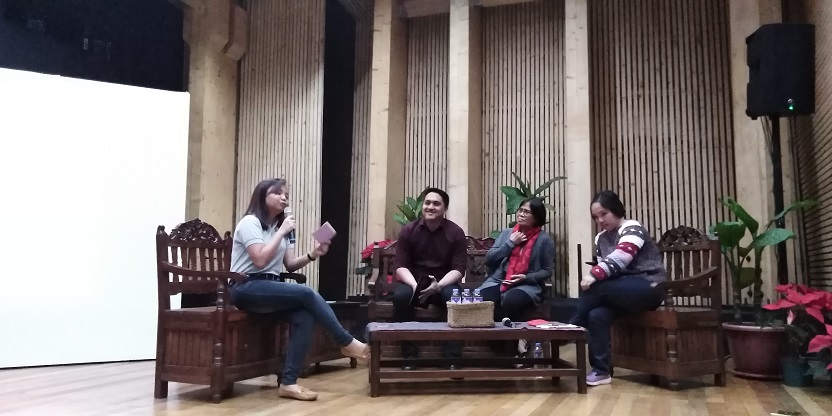
Panel discussion during the Democracy and Disinformation conference at the UP Baguio on Feb. 1, 2019.
“The journalist who looks at journalism as just a job rather than as a human responsibility is not a journalist but only a technician, or worse.”—Luis V. Teodoro, political commentator and retired journalism professor
A self-respecting journalist will not want to be in that “…or worse” category. There may still be some respectability to being a technician, but even in music, technical knowledge will not bring you far if there is no passion. In the journalist’s case, it is a passionate adherence to the art of fact. (With apologies to Kevin Kerrane and Ben Yagoda, authors of “The Art of Fact: A Historical Anthology of Literary Journalism,” for the use of their title.)
At the “Democracy and Disinformation” conference at the University of the Philippines Baguio, this curiosity-seeker came away with her “old-fashioned” views reinforced on the vital role of fact-checking in combating the spread of fake news in print and broadcast media, and more so in social media.
Ellen Tordesillas, president of Vera Files, a media organization that’s been tasked by Facebook to be a third-party fact-checker alongside Rappler and Agence France-Presse Philippines, underscored the importance of double-checking facts and tracking false statements.
She said her group is often accused of focusing on the gaffes of President Duterte and other public personalities in their corrections. But then, she explained, these officials “carry the weight of their offices.” Their words affect the crafting of public policy.
She cited instances when Mr. Duterte pegged the number of drug addicts at 4 million, while the Philippine Drug Enforcement Agency officially placed the figure at 1.8 million.
In three instances captured on three separate news videos, Mr. Duterte claimed that the Catholic Church had 5,000 saints. The figure went up to 7,000, then 35,000 saints. But even the Church doesn’t have an official tally on how many saints it has in its roster.
Tordesillas said the fact-checker’s job, if he or she will debunk disinformation, is to be “supported by verified truth.” He/she must be able to trace the source of the truth.
She defined fake news as “falsified information disguised as news that is spread through one or several platforms, including social media, to deliberately deceive the audience and advance a political, ideological or other agenda.”
She warned that “false news travels six times faster than real news.” It takes another 14 hours to debunk it, because the fact-checker has to get the supporting official documents.
Vera Files has discovered that most Facebook pages that spread disinformation online bear the names of Mr. Duterte or Marcos, while frequent fake news targets are oppositionists like Vice President Leni Robredo and Senators Risa Hontiveros and Antonio Trillanes IV.
Tordesillas said disinformation strategies could be unmasked because these are often crude, adding that fact-checking is basic because “we are fighting lies. Truthfulness is basic to our lives. Lies have no place in our lives. Fake news clouds our decision-making. We must hold people in power accountable. It’s a way of giving voice to the voiceless and catalyzing reforms. If things are based on the truth, mas maganda ang pamahalaan (governance will improve).”
Sherwin de Vera of the online newspaper Northern Dispatch told of how he survived the military’s Red-baiting and Red-tagging when he was identified as a revolutionary tax collector and terrorist, among other falsehoods, when his actual job is of a reporter.
He said that by vilifying individuals and groups, the greater the military’s or the police’s success in mind-conditioning and isolating targets like him.
He criticized typical reports covering the insurgency—how things are reduced to body counts and arms or weapons lost. Details about how military-rebel encounters “impact on the community (are not given), like when the farmers cannot harvest, when virtual martial law is imposed and residents need the proof of a cedula (residence certificate) just to go in and out of their community,” like what happened in Sitio Dandanak, Barangay Tamboan in Besao, Mountain Province.
Reactor Kimberlie Quitasol, also of Northern Dispatch and an Inquirer correspondent, said she still prefers to live in a flawed democracy where “citizens could freely discuss and debate on issues to reach a unified consensus.”
She also expressed grief for the late Northern Dispatch columnist Randy Malayao, who was assassinated in his sleep on a bus while on his way home. She said his columns were devoted to explaining the peace negotiations and the peace process. Quitasol viewed his death in dastardly hands as like disinformation—“an attack on the people’s right to know and a tool of repression so people (can) perpetuate themselves in power.”
She said disinformation “divides people, confuses them. Democracy dies when people cannot speak out against injustice.”
Quitasol invited the conference attendees, mostly communication students, to be “warriors for truth.”
Elizabeth Lolarga, freelance writer and occasional painter, is the author of“Catholic and Emancipated,” a collection of essays put out by the University of Santo Tomas Publishing House.This article first appeared in The Philippine Daily Inquirer on Feb. 9, 2019)